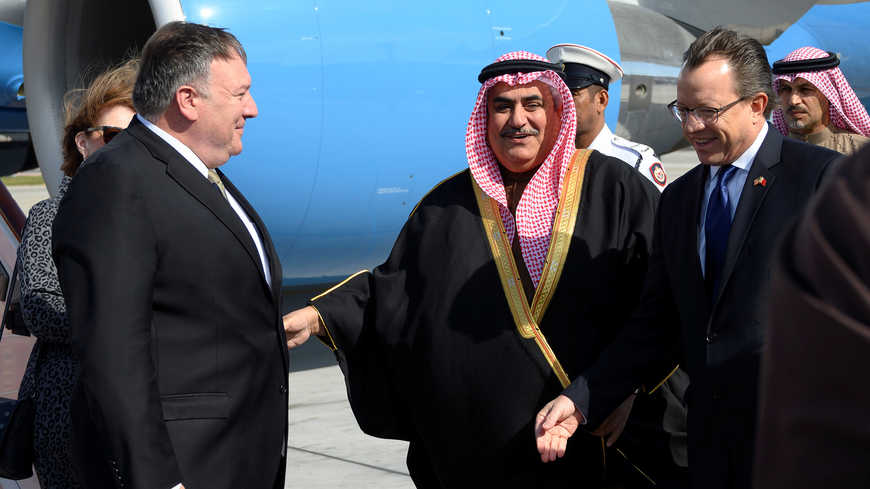
U.S. Secretary of State Mike Pompeo arrived in the Gulf state of Bahrain on Tuesday as part of a Middle East tour following an accord between Israel and the United Arab Emirates to normalise relations.
Israel and the United States have said they are pushing more Arab countries to follow suit. Israel’s intelligence minister has mentioned Bahrain as a possible candidate.
“Glad to arrive in the Gulf today ... We need Gulf unity now more than ever to counter Iran and to build lasting peace and prosperity,” Pompeo said on Twitter. He said it was vital to seize the momentum of the U.S.-brokered deal on normalising relations between Israel and the UAE which was announced on Aug. 13.
Pompeo travelled first to Jerusalem and was in Sudan on Tuesday. He is also expected to visit the UAE. Top UAE and Israeli defence officials on Tuesday held their first publicly-acknowledged phone call since their countries’ agreement to normalise ties, officials said, heralding possible security cooperation.
The conversation between Minister of State for Defence Affairs Mohammed al-Bawardi and Defence Minister Benny Gantz came amid Israeli dissent at the prospect that the U.S.-brokered deal could grant the Gulf power access to advanced weaponry previously denied to it, such as F-35 stealth fighter jets.
In their 10-minute call, Bawardi and Gantz discussed boosting communication “for the benefit of their countries in particular and the region as a whole”, a statement carried by UAE state news agency WAM said.
Gantz’s office quoted him as saying that they agreed to “keep an open channel between them. We share important security interests, collaboration will strengthen regional stability,” a statement from Gantz’s office said.
The normalisation accord, announced on Aug. 13, forges a new axis in confronting Shi’ite Muslim Iran and Sunni Islamist militants in the Middle East, and makes the UAE only the third Arab country to forge ties with Israel in more than 70 years.
But the UAE has argued that the agreement should remove “any hurdle” to advanced U.S. weapons sales, arguing that it eliminates any potential for belligerence between it and Israel.
A senior U.S. State Department official said that “it makes perfect sense for us to be strengthening (the) UAE’s defense capabilities at a time when they’re under new threats for agreeing (to) peace with Israel,” citing potential threats from Iran.
Seeking to allay Israeli security concerns, U.S. Secretary of State Mike Pompeo reassured Israel on Monday that it would retain a military advantage in the region under any future arms deals with the UAE.
An Israeli defence official said that while Israel was firm in opposing any prospective U.S. sale of the F-35 to the UAE, the Netanyahu government was “entirely immersed” on the question of expanding criteria for Israeli defence exports to the Gulf power.
According to defence industry sources, Israel has sold the UAE security products in the cyber and surveillance realm. A study by the University of Toronto’s Citizen Lab has linked spyware technologies produced by Israel’s NSO Group to political surveillance in the UAE.
In the early 2000s, Israel was in talks to sell the UAE drones, according to a U.S. official who was involved in the negotiations - but called off the deal after the 2010 death in Dubai of an arms dealer with the Islamist group Hamas, which Emirati authorities blamed on a Mossad hit team.
In related developments an Israeli delegation and top aides to U.S. President Donald Trump will fly together to the United Arab Emirates on Monday for talks on cementing the two Middle East countries’ deal to normalise relations, Prime Minister Benjamin Netanyahu said.
The high-level meeting would be the first between the three parties since Trump announced the U.S.-brokered accord on Aug. 13.
The deal still awaits negotiations on details such as opening embassies, trade and travel links before it is officially signed.
White House senior adviser Jared Kushner, national security adviser Robert O’Brien, U.S. Middle East envoy Avi Berkowitz and other U.S. officials will travel together with an Israeli delegation led by national security adviser Meir Ben-Shabbat, Netanyahu said in a video statement.
A senior U.S. administration official confirmed the participation of Kushner, O’Brien and Berkowitz, and said U.S. Special Representative for Iran Brian Hook would also be on the flight.
The U.S. and Israeli officials will fly aboard an Israeli airliner direct from Tel Aviv to Abu Dhabi, the first-ever commercial flight between the two countries, Israel’s Kan broadcaster reported.
Talks will focus on ways to promote Israeli-UAE cooperation in sectors such as aviation and tourism, trade, finance, health, energy and security, Netanyahu said.
“This is a historic agreement. It will bring growth engines ... I hope other countries in our region will join the circle of peace.”
The deal would make the UAE only the third Arab country to forge ties with Israel in more than 70 years, after Egypt and Jordan in 1979 and 1994 respectively.
But the prospect that the agreement could grant the Gulf power access to advanced weaponry previously denied to it has upset Israel, and could emerge as a sticking point in negotiations.
During a visit to the region to showcase U.S. support for Israeli-Arab ties, Secretary of State Mike Pompeo assured Israel on Monday it would retain a military advantage in the region under any future arms deal with the UAE.
On Tuesday, top UAE and Israeli defence officials held their first publicly-acknowledged phone call, heralding possible security cooperation.
Source: Reuters




